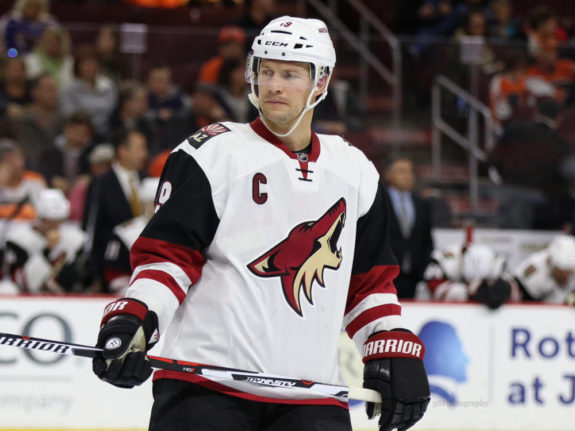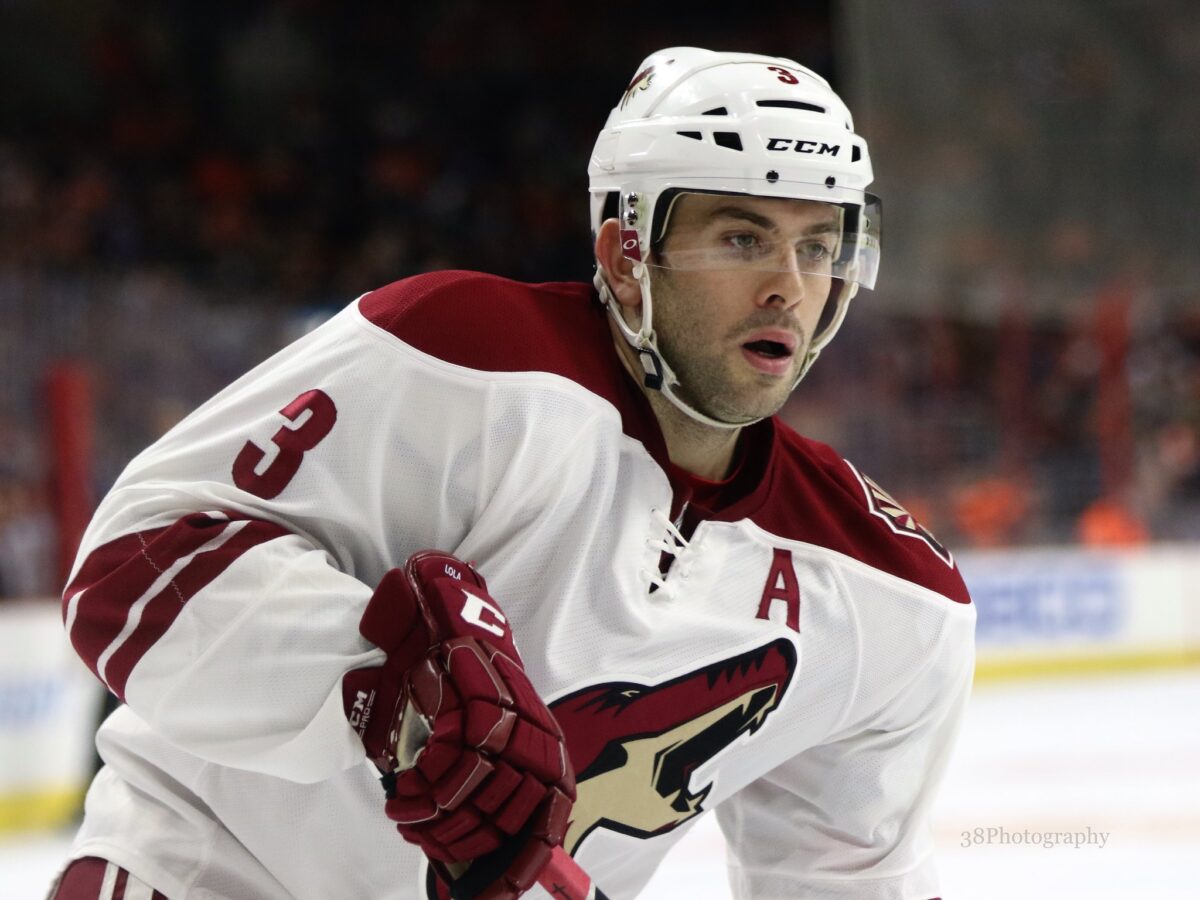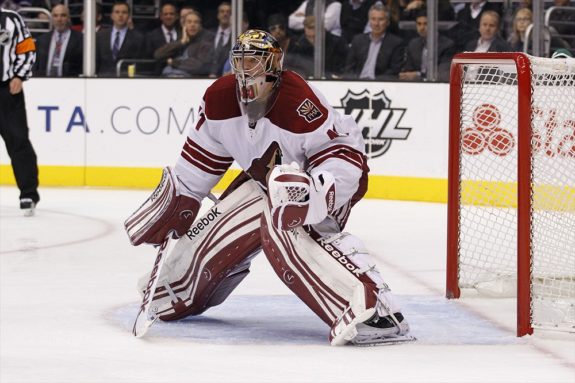Since the Arizona Coyotes were relocated from Winnipeg to the Valley of the Sun, they’ve had an interesting history at the All-Star Break. As a smaller market team, they traditionally don’t garner a lot of attention and views as opposed to a team like the Toronto Maple Leafs and the Vancouver Canucks who are sending multiple players to the event this season. The Coyotes also haven’t been a consistently good team which hurts their chances of sending multiple players. With that in mind, who have been some of the players who have consistently gotten to go to the game representing the team? Has the team ever sent multiple players? In this article, we’ll take a look at the entire history between the Coyotes and one of the NHL’s biggest events.
The 1990s
The 90s started strong in terms of representation of the team. In the first year in the Valley, Keith Tkachuk and Oleg Tverdovsky played in San Jose for the Coyotes. Tkachuk holds the record for the most points scored in a season for the team with 86, a record that has been talked about recently with Clayton Keller almost breaking it last season.
Tverdovsky is an interesting one because he probably is remembered more as an Anaheim Duck but he actually had his best season in his career in the desert. He scored 55 points, 45 of them assists during this season. It would be his only All-Star appearance in his career.
In 1998, Tkachuk was selected once again after having another offensively dominant season, ending it with 66 points. Nikolai Khabibulin would join him in Vancouver as well, marking the first time a Coyotes goaltender would make an appearance in the game. During this season, he put up a 30-28-10 record with a .900 save percentage (SV%).
Khabibulin followed that season up with another appearance at the All-Star Game in 1999 but this time with a dominant 32-23-7 record alongside a .923 SV%. Joining him were three other Coyotes players, the first (and only) time the team has gotten more than two players in the game. Keith Tkachuk was back for his third straight year posting 68 points that season. Teppo Numminen was invited with 40 points but arguably should’ve been brought in the previous season when he had 51. Jeremy Roenick had 72 points that season which made him an easy choice to select. His 72 points started a streak of three seasons where he scored 70-plus. Assistant coach Jim Schoenfield also was chosen to be at the game which was the first time a Coyotes coach was selected to go. It took nearly 20 more years for that honor to happen again.
A common theme you see during the 90s for the Coyotes is that they have players that consistently go. Tkachuk was selected three straight seasons and Khabibulin twice. It makes sense because arguably, these are the seasons where the Coyotes had some of the best players in their franchise history. The team also consistently made the playoffs in these seasons (even though they constantly got bounced in the first round). It’s a theme that changed quickly as the 2000s rolled around.
The 2000s
Roenick was the easy choice to make the event to start the century off. The forward had 78 points that season which would be his highest total in his career not wearing a Chicago Blackhawks jersey. Numminen also joined him with 42 points.
Interestingly enough, despite having another 70-plus point campaign and leading the Coyotes in goals with 30, Roenick wasn’t selected for the 2001 All-Star Game. Instead, Numminen would go for his third straight season even though his 31 points was one of the lowest totals he would put up with the Coyotes. Sean Burke joined him as he went on to start 60 games in his second year with the team.
Burke was the lone selection for the 2002 All-Star Game. His 33-21-6 record deserved to be placed with some of the best players in the game. You also had to consider that the Coyotes were trending downhill around this time so posting that record with players like Roenick leaving is impressive.
In 2003, no Coyote was selected, the only time this has ever happened. The team did finish with a middling record which might’ve been a reason why no one from the team went. Mike Johnson led the team this season in points with 63. A young Shane Doan also scored 58 which is even more confusing when you look at the roster that went. Jeff O’Neill had fewer points than Johnson yet he went to South Florida. Ray Whitney had fewer points as well.

Doan did finally get his All-Star Game in 2004 when he was the lone selection from the team. It ended up being one of his best seasons as a Coyote with 68 points. The next season was cancelled due to the lockout but 2007 was the first time since 2001 where there would be multiple players selected. Both candidates were playing their first seasons with the team. Ed Jovanovski went with 29 points and Yanic Perreault went with 33 points in his lone season as a Coyote.
Jovanovski went again in 2008 during a career year where he scored 51 points. The decade closed with Doan making his second appearance at the event in 2009 with 73 points.
Throughout the decade, it was a mixed bag for the Coyotes. The lowest point was obviously in 2003 when no one was selected. It was around the time the team didn’t make the playoffs for a couple of straight years. Doan was consistently the best player on the team but he only was an All-Star two of those seasons, not even making it in 2008 where he had a career-high 78 points. Burke and Jovanovski also made it twice. There wasn’t a consistent star player going for the team even with Doan putting up some of his best numbers in his career. That theme would be a constant one not being changed until Keller joined the team later in the 2010s.
The 2010s
The beginning of the 2010s was the Keith Yandle show and rightfully so. He had a 59-point season in 2011 that he wouldn’t come close to passing until nine seasons later with the Florida Panthers. The defenseman made it again in 2012 with 43 points. Head coach Dave Tippett would’ve been a nice representative around this time especially considering he led the team to their only division title that season.

Due to the lockout and the Olympics, the next game was in 2015 where Oliver Ekman-Larsson was the Coyotes’ representative. He had 43 points during the season, 23 of them goals which would be a career high for him.
2016 was the John Scott year. He was voted in by fans to be an All-Star even after scoring one point in 11 games with the Coyotes. The NHL and the team attempted to remove him from the game, even trading him to the Montreal Canadiens to try to keep him from going. However, due to fan support, he was named captain of the Pacific Division team and was named MVP of the whole tournament after scoring two goals and winning the whole thing with his team.
If 2016 wasn’t a weird one, maybe 2017 was. Mike Smith was the Coyotes’ candidate and was the first goaltender to make it to the event since Burke back in 2002. It should’ve happened sooner as Smith was one of the best goaltenders in Coyotes’ history. His .930 SV% helped the Coyotes make the playoffs in 2012 and his fantastic play in the postseason got the team only a couple of wins away from the Stanley Cup Final. It is impressive to note that even though the team had a below .500 record, he managed to keep his SV% above .900. It was also his last season in the desert, as he signed with the Calgary Flames in the offseason.

Ekman-Larsson got the nod again in 2018 during a season where he tied his career-high in points with 44. To round out the decade, Keller got his first appearance despite having a difficult season on the ice, only scoring 47 points in a full season. Then again, everyone was struggling offensively with good defense and remarkable play by Darcy Kuemper keeping the team in playoff contention.
The 2010s was another decade where there wasn’t a key player constantly making the event. Smith and Doan deserved to make it a couple more times throughout the seven All-Star Games but Ekman-Larsson and Yandle both made it twice which led the team in appearances. The early 2010s also saw some of the best seasons in franchise history where a lot of underrated players had great seasons. For example: Whitney had 77 points during the 2011-12 season and absolutely should’ve been nominated for the game.
The 2020s
The decade started with Kuemper being named as the lone All-Star. The goaltender arguably deserved to make the game in 2019 but his SV% in 2020 was a career high at .928. Head coach Rick Tocchet also made the game as coach of the Pacific Division, making him the first head coach to make it as a Coyote. It made sense as the team went on to make the playoffs for the first time since 2012.
Related: Comparing Logan Cooley’s Rookie Season to Coyotes’ Teammates
For the next three seasons, Keller was the Coyotes’ representative. He had 63 points in 2022, a career-high in points with 86 in 2023, and currently 41 points in 2024. With the three selections, he has become the leader in All-Star appearances with four. It’s no surprise as the forward has become the face of the Coyotes as the young team continues to develop.
It’s been an up-and-down history at the All-Star Game for the Coyotes. There are a lot of players that have been snubbed in career seasons. However, the current rebuild for the team is coming to an end and players like Logan Cooley and Dylan Guenther are beginning to make the team and make an impact as well. It’s only a matter of time before we see multiple Coyotes make the All-Star event for the first time since 2007. It’s also only a matter of time before the event makes a stop in the Phoenix metro area. The team should look at its past in the event though and be proud before they take their next big step in history.
